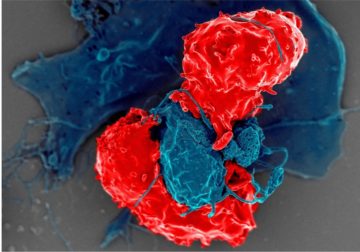Natalia Mesa in The Scientist:
 Without the trillions of bacteria in the gut, muscles might not be able to knit themselves back together after an injury. According to a study published February 22 in Immunity, T cells that normally reside in the mouse colon play a crucial role in tissue regeneration—and rely on gut microbes to do so. Without these helpful microbes, the study suggests, inflammation could get out of control, preventing healing and causing fibrosis. “The main message of the paper is that the microbiota is influencing your immune system and your general health in a way larger way than we appreciated before,” says Bola Hanna, an immunologist at Harvard Medical School. Hanna studies regulatory T cells, a class of immune cells found in tissues throughout the body. He describes regulatory T cells as the “peacekeepers” of the immune system because they rein in other immune cells, ensuring inflammation doesn’t get out of control.
Without the trillions of bacteria in the gut, muscles might not be able to knit themselves back together after an injury. According to a study published February 22 in Immunity, T cells that normally reside in the mouse colon play a crucial role in tissue regeneration—and rely on gut microbes to do so. Without these helpful microbes, the study suggests, inflammation could get out of control, preventing healing and causing fibrosis. “The main message of the paper is that the microbiota is influencing your immune system and your general health in a way larger way than we appreciated before,” says Bola Hanna, an immunologist at Harvard Medical School. Hanna studies regulatory T cells, a class of immune cells found in tissues throughout the body. He describes regulatory T cells as the “peacekeepers” of the immune system because they rein in other immune cells, ensuring inflammation doesn’t get out of control.
“To find that immune cell populations that are modified [in the gut] . . . have systemic effects and influence physiological and pathophysiological processes that occur elsewhere is obviously of major interest,” says Alexander Rudensky, an immunologist at Memorial Sloan Kettering Cancer Center who was not involved in the study. “It sets the stage to explore further other aspects of physiology that can be affected by the cells generated in the intestine.”
More here.
